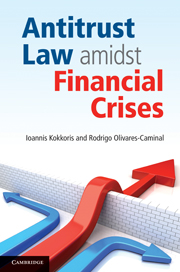Book contents
- Frontmatter
- Contents
- Foreword by Philip Lowe
- Foreword by Frederic Jenny
- Preface
- Table of cases
- Table of treaties and other international instruments
- Introduction
- 1 Introduction to competition law: EU, US and UK
- 2 Some notes on crises
- 3 Failing-firm defence
- 4 Efficiencies
- 5 Crisis cartels
- 6 State aid (Phedon Nicolaides)
- 7 Competition enforcement in periods of crisis
- 8 Conclusion
- Index
8 - Conclusion
- Frontmatter
- Contents
- Foreword by Philip Lowe
- Foreword by Frederic Jenny
- Preface
- Table of cases
- Table of treaties and other international instruments
- Introduction
- 1 Introduction to competition law: EU, US and UK
- 2 Some notes on crises
- 3 Failing-firm defence
- 4 Efficiencies
- 5 Crisis cartels
- 6 State aid (Phedon Nicolaides)
- 7 Competition enforcement in periods of crisis
- 8 Conclusion
- Index
Summary
Of all the human powers operating on the affairs of mankind, none is greater than that of competition.
Henry Clay (1777–1852)As a result of the recent crisis, we have experienced instances where competition policy has been set aside due to special and exceptional circumstances. These special and exceptional circumstances can be the collapse of a bank that can trigger a systemic crisis. Therefore it is important to have a clear understanding of the rules (competition law) and the exceptions to those rules, especially in the presence of such exceptional circumstances. In addition, it is important for distressed entities and policy-makers to understand clearly the array of options that they have in advance since these can be used as part of their ‘crisis toolkit’. The aim of this book has been to provide an analysis of such exceptions to competition law and policy, particularly in the context of a financial crisis.
The key issue that this book has addressed is whether the risk of a systemic crisis can justify the adoption of a more lenient approach. In summary, the book has provided a comprehensive understanding of the rationale of competition law in the light of conflicting interests (promoting competition versus the collapse of a firm that might result in a systemic crisis). It has analysed the foundations of concepts such as failing-firm defence, efficiency defence, crisis cartels and state aid and assessed how these concepts should apply in periods of crisis.
- Type
- Chapter
- Information
- Antitrust Law amidst Financial Crises , pp. 499 - 509Publisher: Cambridge University PressPrint publication year: 2010



